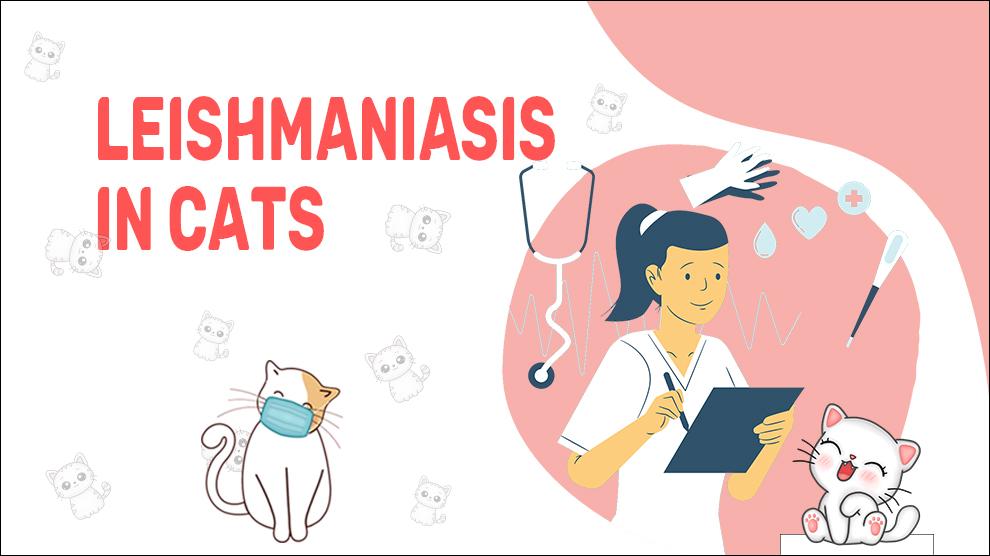What Is Leishmaniasis In Cats?
Leishmaniasis is a parasitic disease that affects both humans and animals, including cats.
The disease is caused by a protozoan parasite called Leishmania, which is transmitted through the bite of infected sandflies.
In cats, leishmaniasis can lead to a variety of symptoms, ranging from mild skin lesions to severe kidney and liver damage.
It is important for cat owners to be aware of the signs and symptoms of leishmaniasis and to seek veterinary care if their cat is exhibiting any of these symptoms.
Clinical Signs Of Leishmaniasis In Cats
The symptoms of leishmaniasis in cats can vary depending on the severity of the infection and the organs affected.
Some common symptoms include:
- Skin lesions: Cats with leishmaniasis may develop skin lesions that can be either raised or flat. These lesions are usually located on the face, ears, and limbs.
- Hair loss: In addition to skin lesions, cats may experience hair loss around the affected areas.
- Weight loss: Leishmaniasis can cause cats to lose weight even if they are eating normally.
- Lethargy: Cats with leishmaniasis may seem tired and listless, and they may not be as active as usual.
- Fever: A fever is a common symptom of leishmaniasis in cats, although not all infected cats will develop one.
- Organ damage: In severe cases, leishmaniasis can cause damage to the kidneys, liver, and other organs, which can lead to further complications.
- Lack Of Appetite
- Vomiting
- Diarrhea
- Bleeding In Nose
- Exercise Intolerance
- Black Stool
- Brittle Hair
- Scaly Skin
- Thickening Of The Skin
- Discoloration Of Skin
- Skin Ulcer
- Crusting On The Skin
- Nodules In Skin
- Enlarged Lymph Nodes
Treatment Options For Leishmaniasis In Cats
Treatment for leishmaniasis in cats typically involves medication to kill the parasite and manage symptoms.
Common medications used to treat leishmaniasis in cats include antimonial drugs, which can be administered through injections or orally, and allopurinol, which is an oral medication that helps to reduce inflammation and prevent the parasite from replicating.
In severe cases, hospitalization may be necessary to manage organ damage and provide supportive care.
Home Remedies For Leishmaniasis In Cats
There are no proven home remedies for treating leishmaniasis in cats.
However, owners can take steps to prevent their cats from getting the disease by keeping them indoors during peak sandfly activity, using insect repellents, and ensuring their cats are up to date on their vaccinations.
It is also important to keep your cat's environment clean and free of standing water, as this can attract sandflies.
How To Prevent Leishmaniasis In Cats?
Preventing leishmaniasis in cats can be challenging, but there are a few steps cat owners can take to reduce the risk of infection.
Keeping cats indoors during peak sand fly activity, which is typically at dusk and dawn, can help to minimize exposure to infected sand flies.
Using insect repellents, such as those containing DEET, can also be effective at repelling sand flies. It is important to note that there is currently no vaccine for leishmaniasis in cats.
Affected Cat Breeds Of Leishmaniasis
Leishmaniasis can affect all breeds of cats. However, some studies suggest that certain breeds may be more susceptible to the disease, such as Siamese, Abyssinian, and Burmese cats.
Additionally, outdoor cats that live in areas with high prevalence rates of the disease are also at a higher risk of being infected.
Causes For Leishmaniasis In Cats
Causes:
Leishmaniasis is caused by a protozoan parasite called Leishmania, which is transmitted through the bite of infected sandflies.
When an infected sandfly bites a cat, the parasite is injected into the cat's bloodstream and begins to reproduce in the cat's cells.
The incubation period for leishmaniasis in cats can range from several weeks to several months, and not all infected cats will show symptoms.
When To See A Vet For Leishmaniasis In Cats?
If a cat is exhibiting any of the symptoms of leishmaniasis, such as skin lesions, hair loss, weight loss, lethargy, or fever, it is important to seek veterinary care as soon as possible.
Early diagnosis and treatment can help to minimize the severity of the infection and prevent further complications.
Food Suggestions For Leishmaniasis In Cats
There are no specific dietary recommendations for cats with leishmaniasis. However, a balanced and nutritious diet can help support your cat's overall health and immune system, which can help them fight off infections.
Conclusion
Leishmaniasis is a serious disease that can affect cats and other animals. It is caused by a parasitic infection and is transmitted by sandflies.
Although there is no cure for the disease, early diagnosis, and treatment can help manage symptoms and improve a cat's quality of life.
Owners can take steps to prevent their cats from getting the disease by using insect repellents and keeping them indoors during peak sandfly activity.
If you suspect your cat may have leishmaniasis, it is important to see a veterinarian as soon as possible.











